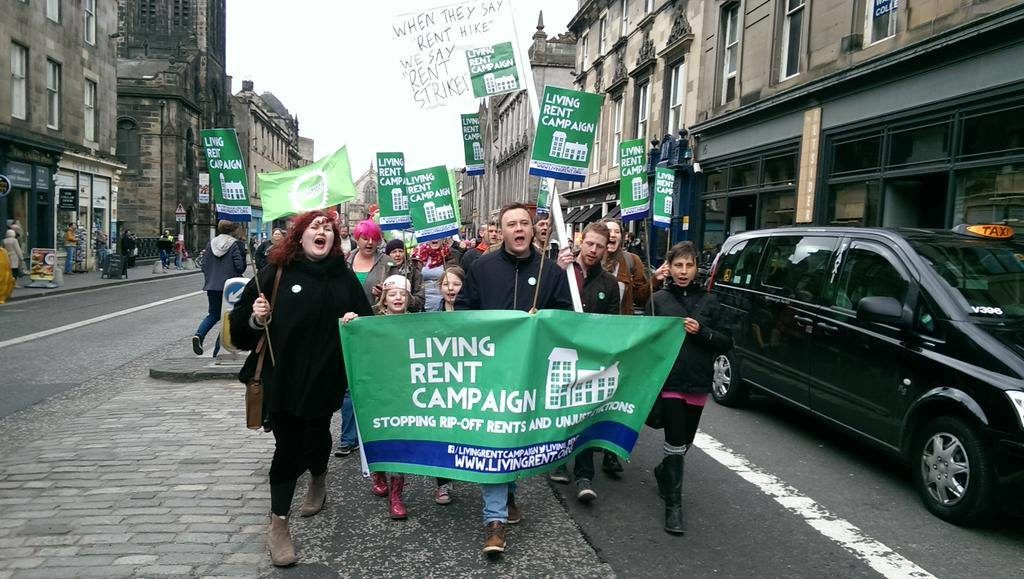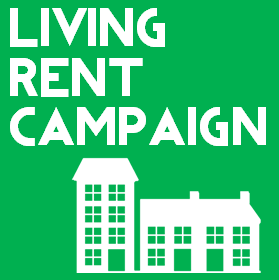Living Rent: Catching up with Scotland’s Tenants’ movement

In October’s article, I introduced you to Living Rent and their work on rented housing. Their work has only increased and become more pressing as the pandemic has continued. Gloria and Meg are members of Living Rent’s National Committee, elected by its members. They reflected on the last six months of Living Rent: what the union has been working on; the issues tenants are facing in Scotland; and what’s next.
Since the last piece covering Living Rent’s work in October, what has the union been working on?
Meg: One key thing is the release of the Tenants’ Manifesto, which Living Rent launched in October and has been campaigning on. The manifesto comes from long term work carried out by both public and private tenants and is spearheading our campaigning going into the Holyrood elections. We are using it to ensure that candidates are aware of our needs and demands. It’s also a useful framework because we’re able to tie local issues branches are facing, like the vacant land at Collina Street, to a national campaign.
Gloria: The Tenants’ Manifesto gives us an opportunity to do more joined-up campaigning across the union that is tailored to our local branches but has overarching demands that we can use at a national level — it requires us to talk to one another internally.
Meg: One important thing is the extension of the eviction ban in December and the recent further extension. This is crucial, especially if the Scottish Government wants to keep us in lockdown. Because they’ve had to do it the first time around, it’s set a precedent; it’s really hard to ignore that it’s ethically wrong to be kicking people out of their homes, in the midst of a pandemic. You shouldn’t be doing it at any point, but it’s especially clear now.
We’ve also seen that Edinburgh city council has frozen rents for social housing tenants off the back of their campaigning. This was in large part a response to pressure from the Edinburgh Tenants’ Federation, but the Muirhouse branch of Living Rent was also heavily involved in this. It’s now important that the Council keep up the maintenance of homes that at one point they threatened to renege on in light of the rent freeze.
Gloria: Even though we’ve been in the highest level of lockdown since just after Christmas, we have been able to do physical organizing in some ways. The occupation at Collina Street in Glasgow is really important because the local Living Rent branch are occupying land that formerly had social housing on it, and are demanding that the Council facilitate the building of social and democratically controlled housing once again on that space. That’s really, really important– it’s so inspiring to me that other people in the union have been inventive enough to literally manifest and hold bases that have lots of symbolic value and build a campaign around that. At this point. I feel very, very inspired and very hopeful from just that tactic as much as anything else.
How would you describe Living Rent’s overall goals and techniques?
Meg: Living Rent works to tackle the power imbalance between landlords and tenants; but I think it actually goes further than that, too. We build community by defending it. We’re working to change the dialogue around not only what a house means in terms of making it a fundamental human right, but also what it means to be a renter and to be a tenant. We are using housing as a means to build a more just society for all.
Gloria: Our goal is to demonstrate a political organising model that has effective outcomes. And by that, I don’t just mean the outcomes of that organising model in terms of the victories that we use to encourage people to join, or even just the tactical power that we build, but also the relationships that we build with one another and the frameworks that we use to support one another’s growth, development, and emotional well being.
Tactically, we encourage and support self-advocacy, like autonomous ways of dealing with some of the housing problems that members come up with. At the basic descriptive level, that often means we help each other write the statements that need to be sent to landlords or letting agents and we help each other make a plan of action as to how to protect our rights. We’re also using our knowledge of individuals’ housing problems, and collective housing problems in, for example, a housing association or a particular geographic area, to inform our campaigns and the way we advocate for ourselves as renters.
Meg: Circulating knowledge that is accessible to everyone is important; a number of our members attended Jane McAlevey’s Strike School and we regularly run training sessions on a number of different skills. One of the best tactics and strategies that we have is direct action. This is really important for the union because it shows that we’re not just sitting back passively and circulating critique and knowledge about our housing situations and how it’s bad, but we’re actually taking the fight directly to landlords and the government.
Why is this work needed in Scotland right now? What are some of the key issues we’re facing?
Gloria: Some of the ongoing problems are: the growth of Buy-to-Let landlordism, the ongoing after-effects of the effective privatization of what was formerly local state-controlled housing, combined with the demolition of quite a quantity of that social housing, and the failure to build new, genuinely democratic and affordable social housing
Meg: More social housing is crucial; we can talk about building affordable housing, but affordable housing can often still be opposed to public housing and it’s not necessarily democratic. In the private rental sector, we need rent controls — that’s been a demand since Living Rent was founded. We need rent controls that bring rents down rather than just limiting increases and that incentivize better maintenance of properties. We also need measures that ensure sustainability– making sure that housing is not just a decent quality, but it’s green housing. We need better protections for tenants in both private and social tenancies. We also want to change the grounds for eviction; we’ve lost no-fault evictions, but it’s still too easy for tenants to be forced out of their home, whether it be with a formal eviction notice, because they’re being priced out, or otherwise having to leave when they don’t want to.
Gloria: As a private renter, I feel particularly keenly that private landlords are still able to act with impunity in Scotland. As Meg touched on, even if they’re breaking the law, the enforcement of the law and the application of existing legislation is still a problem. Especially in the Southside of Glasgow, where I live, a lot of the private rented sector houses are in an appalling state; really, really appalling. Actually, in a sense, the private rented sector lacks some of the regulatory or health and safety frameworks that do exist in the social rented sector, and that we’ve been able to use as leverage, though those regulations are still often not maintained in the social rented sector. During the pandemic, tenants have been pushing hard on the cleansing and the sanitation of public housing, and we haven’t been able to do that so effectively with private housing.
Meg: Even in the social rented sector, particularly in public housing, trying to get repairs done can be almost impossible — some residents have had ongoing leaks for about 15 years that are just not being fixed. There are kids that are being hospitalized because they’re breathing in mould and damp and asbestos.

How do you see the work Living Rent does relating to a broader socio-political context?
Meg: Market-driven housing ideologies are so dominant now, not only in Scotland but across most of the capitalist world. And so we’ve gone from seeing housing as a human right to an asset base and source of financial security. I think it’s particularly acute in Scotland because we have this valorization and romanticism of homeownership and private property while we think about how much we value inherited wealth in this country. Homeownership is seen as a condition for social status, or in some cases even successful citizenship, and so we present renters as unambitious or idle and the homes that renters are living in as temporary, both just awaiting the transition to a better life. This is an ideological battle that we need to fight against while resisting any further attacks on public housing or protections for renters in order to protect housing as a human right rather than a means for profit.
Gloria: I think the political work we’re doing, as Meg said, is partly discursive; we’re changing the story. We’re trying to move the Overton Window so that the framing is such that a house is not someone’s asset, but a home and a place to live. Something I struggle with sometimes is that I think people see something like private sector renting as a step on the ladder to home ownership. Home ownership isn’t an aspiration of mine but I can see why, pragmatically, it’s an aspiration for many people, because renting is so incredibly expensive. The more we build on the demands around rent controls and social housing, I really hope that we can shift the political story, including how politicians talk about it and how policy is written, to frame housing as a fundamental right.
What’s your vision for the future of the union?
Gloria: I would like us to get rent controls, and then provide merciless scrutiny for the enforcement of those rent controls, which I think will be the next fight on the rent controls. But I would also like to push beyond the question of merely keeping rent aligned with inflation, PPI, or whatever, and to continue to open out real material organizing on democratically controlled, affordable sustainable housing. I want us to create conditions under which more people’s voices are centred in Scotland’s political landscape.
Meg: We formed as a result of the 2014 consultation on rent controls, so it’s been part one of the central demands of the union since it started. My overall goal for Living Rent is expansion. I want us to be the biggest and most cohesive and structured and powerful tenants movement possible, and I think Living Rent has the potential to do that. It’s a really internationally exciting example of a grassroots tenants’ movement. I also want us to work in tandem with our sister unions in other countries; our existence has to be as global as the forces that oppress us. Having those networks of support that reach across borders helps build solidarity between tenants as a class.
How can people get involved or support Living Rent?
Ask your local candidate to commit to the Tenants’ Manifesto.

In the UK, perhaps the last time housing was seen as something the state must provide was during the WW2-caused housing shortage. My grandparents spoke fondly of living in a pre-fab after the war. It may be that mass environmentally-friendly, low cost, high-quality (partly because it is apparently easier to do achieve economies of scales and quality checks in factories) would firstly reduce rents and profiteering in the private sector, then set standards that the private rented sector would need to aspire to.
https://en.wikipedia.org/wiki/Prefabricated_home#The_future